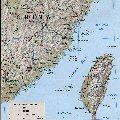Taiwan, China Open First Semi-Official Offices
Both Taiwan's tourism office in Beijing and China's office in Taipei are staffed with government officials. The main function of the offices is to promote travel and cultural exchanges, but the fact that officials are there is what carries the most significance.
Yang Jui-tsung, is the director of the Taiwan Strait Tourism Association office in Beijing and is the first senior Taiwanese official to be based in China.
Yang says the establishment of offices on both sides that are staffed with government officials is a very positive development and a symbol of mutual efforts toward peace and compromise.
Yang says that the opening of the offices is likely to lead to progress in other areas as well.
Ties between Taiwan and China are currently the closest they have been in decades. Since Taiwan President Ma Ying-jeou took office in 2008, he has promoted ties with Beijing and made an effort to put the two sides political disputes aside and focus more on the economic relationship.
In the past few years, Taiwan has begun allowing Chinese tourists to visit the island in an effort to boost the economy and established regular direct transportation links. High-level talks have also resumed.
Joseph Wu, a former head of Taiwan's top China policy agency, the Mainland Affairs Council, says the opening of the tourism office is significant and positive because of the official presence it will bring to both sides. "It would allow the two sides, especially the officials, to be able to meet with each other and speak with each other on those practical issues and gradually we hope that mutual confidence, mutual trust can be established over time," Wu said. But he notes that there is concern among some in Taiwan -- most notably the opposition Democratic Progressive Party - that ever increasing ties with its massive neighbor will give the international community an impression that Taiwan has already accepted it is a part of China.
China and Taiwan have been under separate governments since 1949, when Mao Zedong's Communists took power in on the mainland. However, China continues to claim the self-ruled island is part of its territory.
Liu Hsiao-hsu, a businesswoman from Taiwan and research fellow at China's People's University, says the island's unique relationship with China and its domestic politics are a constant challenge to closer economic ties. "I think Taiwan right now is facing a really huge obstacle in our political conflicts. And, these political issues have too much influence on the economy. Of course we cannot deny or escape the relationship between the economy and politics," she said. "But I think that Taiwan has no natural resources. Taiwan has to rely on international trade." Liu says that one way Taiwan can help improve the situation is to push forward with a proposed trade agreement with China called the Economic Cooperation Framework Agreement.
She says it is important because the agreement, or ECFA as it called, seeks to gradually transition Taiwan and China into a free trade zone. "I think that ECFA is a chance for both parties, both China and Taiwan, to forget about the politics and focus on the economy," she added. Joseph Wu says Taiwan's main opposition party, the DPP, believes the trade agreement will further raise unemployment and hurt the competitiveness of Taiwanese companies. "Taiwan's so called sunset industries, small and medium enterprises or farmers might stand to lose, Chinese capital and laborers or Chinese goods are going to come into Taiwan over the years and that is going to have a major impact on Taiwan's economy," he stated. The island's ruling Nationalist party says Taiwan needs the agreement because the island is being left behind as other economies in the region push forward with free trade agreements. According to Taiwan's government, free trade agreements in Asia have grown from three in 2000 to 58 in 2008. The government notes that in Asia, Taiwan and North Korea are the only two economies that have yet to benefit from such agreements.

